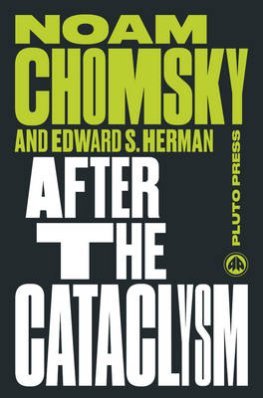After the Cataclysm
There is no single cause for the misery and oppression we find in every part of the world. But there are some major causes, and some of these are close at hand and subject to our influence and, ultimately, our control. These factors and the social matrix in which they are embedded will engage the concern and efforts of people who are honestly committed to alleviate human suffering and to contribute to freedom and justice. [p344]
This particular volume deals with Indochina in the years following America’s wars there, but it is concerned less with an account of the way those countries dealt with the aftermath of the wars and more with an analysis of the way Western media described the situation to their American and other Western audiences.
We have not developed or expressed our views here on the nature of the Indochinese regimes. To assess the contemporary situation in Indochina and the programs of the current ruling groups is a worthwhile endeavour, but it has not been our objective. [p344]
Our primary concern here is not to establish the facts with regards to postwar Indochina, but rather to investigate their refraction through the prism of Western ideology, a very different task. We will consider the kinds of evidence used by the media and those naive enough to place their faith in them, and the selection of evidence from what is available. [p160]
One amusing comment often repeated on social media is that if the USA had lost the War of Independence against the tyranny of the British empire, they might instead have ended up resembling Canada; the implication is usually that this outcome might have been preferable. For Laos, Cambodia and Vietnam, the alternative option which the USA deployed such astonishing firepower to enforce on their peasant populations was the violently oppressive “sub-fascism” of America’s client regimes in Thailand, Indonesia or the Phillipines, or those of Latin America. Since these options would be appalling to any objective observer, it was important to the Americans to convince the world that the people of Indochina were suffering dreadfully under their “communist” postwar regimes, while diverting attemtion entirely from the grim record of their own supposedly capitalist (actually fascist) clients.
Now that the countries of Indochina have been pounded to dust, Western ideologists are less fearful of the demonstration effect of successful communism and exults in the current willingness of the Western satellites of ASEAN to cooperate in “peaceful competition”. In the London Observer Gavin Young reports on ASEAN’s program of obliterating Communism “not with bombs but with prosperity”, under the leadership of the smiling humanitarian Marcos, Lee Kuan Yew, Suharto, Hussein Onn of Malaysis and General Kriangsak of Thailand (with his “dark, puckish face, at once warm-hearted and mischievous”) and are now firmly set to eradicate the ills of their societies, as Young discovered when he interviewed them on their gold courses. ... Imagine what the reaction would be in the West to a featured article in the press explaining how wondrous Asian communism is becoming, based exclusively on interviews with Kim Il-Sung, Pol Pot, etc. [p13]
So then, this books offers an intensive review of the way Western media [mis]reported on post war Indochina, supported with comprehensive evidence, and indeed the technical footnotes comprise a good quarter of the book’s volume. While this is not unreadable it is probably better described as a reference source than a popular history. I read through all the same because I have yet to find a comparable account in more accessible form.



0 Comments:
Post a Comment
Subscribe to Post Comments [Atom]
<< Home